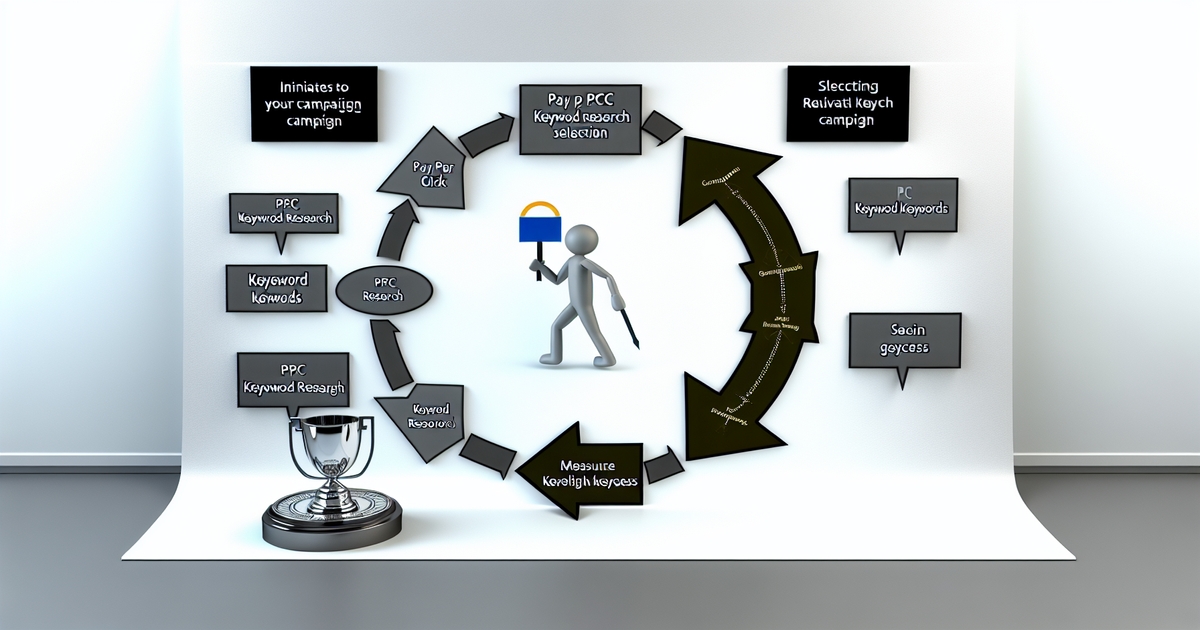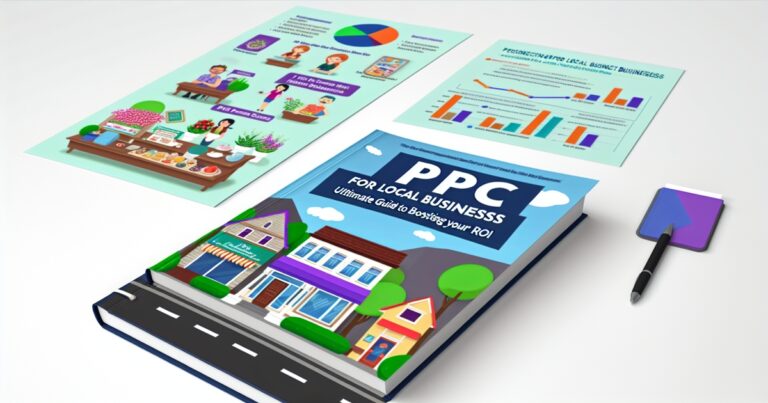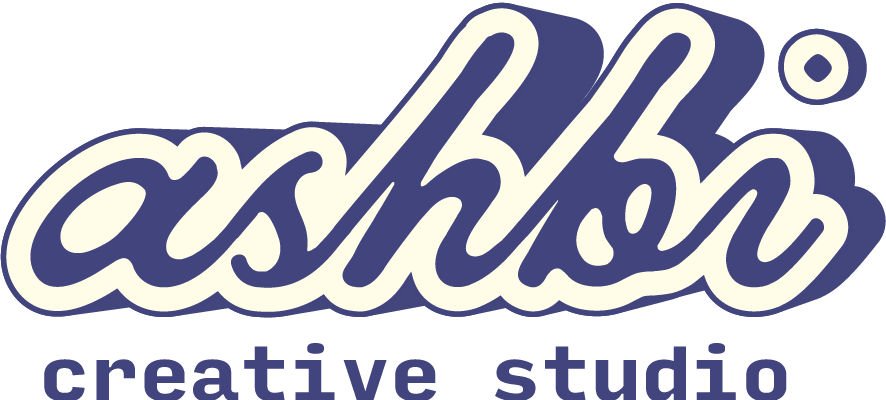Did you know that 64.6% of people click on Google ads when they’re looking to buy an item online? That’s a huge chunk of potential traffic, and it all starts with nailing your PPC keyword research and selection. It’s not just about throwing in the most popular keywords and hoping for the best. It’s a fine art of balancing what people are searching for with what you can uniquely offer them. This blog post is your no-nonsense guide to understanding the ins and outs of choosing keywords that don’t just attract clicks, but convert visitors into customers. Let’s dive deep into making your business’s PPC campaigns stand out by selecting the right keywords through WordStream research without getting lost in the sea of competition and search volume.
Key Takeaways
- Effective PPC keyword research and selection are foundational to building successful advertising campaigns, ensuring that your ads reach your target audience efficiently.
- Setting clear PPC campaign goals is crucial for aligning your keyword strategy with your business objectives, whether it’s increasing brand awareness, generating leads, or driving sales.
- Proper keyword selection and categorization help in creating more targeted ad groups, improving ad relevance, and enhancing the overall performance of your campaigns.
- Utilizing a mix of tools and techniques for keyword research, such as Google Keyword Planner and competitor analysis, can uncover valuable insights and opportunities for optimization.
- Budgeting wisely and focusing on cost efficiency in your PPC campaigns enable you to maximize return on investment (ROI) by allocating resources to high-performing keywords and ad placements.
- Regular campaign management, optimization, and analysis of performance metrics are essential for adapting strategies, identifying areas for improvement, and achieving sustained success in PPC advertising.
Understanding PPC Keyword Research
Importance
PPC keyword research is crucial for driving targeted traffic to a business website, for example, adding keywords targeting women. This process allows you to reach users who are actively searching for products or services like yours. By targeting these individuals, you enhance your visibility in search engine results, which can significantly boost your site’s traffic.
Moreover, precise targeting through effective PPC keyword selection increases the likelihood of conversions. Users arriving at your site through these targeted searches have a higher intent to purchase or engage with your content. Thus, selecting the right keywords through research is not just about attracting more visitors but adding value to your business by attracting the right kind of visitors who are more likely to convert.
Strategies
To excel in PPC campaigns for your business, focusing on long-tail keywords and thorough research is essential. These keywords are longer and more specific phrases that users might enter when closer to a point-of-purchase or when using voice search. They often have less competition and can be less expensive per click than shorter, more generic terms.
Balancing between high and low competition keywords through research is also vital for a successful strategy. High competition keywords may drive significant traffic but can be costly and challenging to rank for. On the other hand, low competition keywords might attract fewer searches but can offer better ROI due to their specificity and lower cost.
Utilizing various keyword research tools plays a pivotal role in discovering potential keywords for your campaigns. Tools like Google Keyword Planner help research and identify both broad terms and niche-specific long-tail phrases that could drive qualified leads.
Search Intent
Understanding the user’s search intent behind each query is fundamental in PPC keyword research. Generally, there are three types of search intents: informational (looking for information), navigational (searching for a particular website), and transactional (ready to buy or perform keyword research).
Tailoring your chosen PPC keywords according to different stages of the buyer’s journey, including the research phase, ensures that you capture potential customers regardless of their buying cycle stage.
Prioritizing keywords with commercial intent, especially those indicating readiness to purchase (“buy,” “deal,” “discount”), optimizes PPC campaign efficiency by directly targeting users most likely ready to make transactions through search.
Organizing Keywords
Effectively organizing PPC search keywords into coherent groups enhances campaign focus and relevance—grouping by theme aids in creating focused ad groups that cater specifically towards segmented audience interests or needs.
Segmentation further refines this structure by allowing marketers to target even narrower audiences based on specific criteria such as demographics, behavior patterns, or keyword search.
Building PPC Campaign Goals
Optimizing Goals
Once you’ve grasped the basics of PPC keyword research, setting precise goals becomes your next big step. It’s about knowing what you want to achieve. You can measure success through key performance indicators (KPIs) like click-through rate (CTR), conversion rate, cost per click (CPC), and keyword search. These metrics guide your campaign towards tangible outcomes.
First, align your keywords with specific campaign objectives. If your goal is brand awareness, focus on search keywords that highlight your unique value proposition. For sales conversions, target keywords with buying intent behind them. Adjusting bids based on these performance metrics ensures you’re investing in what works best for your campaign.
Budget management is crucial in PPC campaigns. Allocate funds wisely across keywords by considering their competitiveness and potential return on investment (ROI). Competitive keywords often require higher bids but can lead to significant gains if managed well.
Automated bidding strategies come in handy here. They adjust bids in real-time to maximize budget efficiency without constant manual oversight. However, don’t set it and forget it; regular monitoring allows for timely adjustments to avoid overspending or missing opportunities.
Budget Management
Managing a budget effectively requires understanding the landscape of keyword competitiveness and ROI potential. Start by categorizing keywords into groups based on these factors:
- High competition/high ROI
- Low competition/low ROI
This helps prioritize where to allocate more budget for maximum impact.
Next, embrace automated bidding strategies like Google Ads’ Smart Bidding, a keyword-focused tool that uses machine learning to optimize spend for conversions or conversion value in each auction—a powerful tool for maximizing efficiency within a given budget framework.
Finally, keep an eye on spending patterns regularly—daily or weekly—to ensure you’re not exceeding budgets while also identifying underperforming areas that need bid adjustments.
Quality Score
Improving quality score, by optimizing keyword usage, is synonymous with enhancing user experience—both go hand-in-hand towards achieving better ad rankings at lower costs.
Focus first on landing page relevance; ensure content directly addresses the search queries leading users there. A seamless connection between ads and landing pages, incorporating relevant keywords, improves user satisfaction and boosts conversion rates.
Craft compelling ad copy that stands out while remaining relevant to targeted keywords—it’s a surefire way to increase CTRs without inflating CPCs unnecessarily.
Lastly, optimizing ad relevance involves continuous testing and refinement of ad texts concerning chosen keywords ensuring they resonate well with intended audiences thereby improving overall quality scores significantly.
Keyword Selection and Categorization
Types of Keywords
After setting your PPC campaign goals, it’s crucial to select the right types of keywords. Broad match keywords are less specific and can trigger your ads for variations including synonyms, related searches, and more. This keyword type is good for reaching a wide audience but might bring in irrelevant traffic.
On the other hand, exact match keywords target users searching for that exact term or close variants. They offer precision targeting but limit reach. For a balance between reach and relevance, phrase match allows your ad to show for searches that include the meaning of your keyword.
Another important distinction is between branded and non-branded keywords. Branded ones include your company name or specific products. They usually have higher conversion rates since they target people already familiar with your brand through keyword searches. Non-branded keywords help you reach new prospects who are looking for products or services like yours but may not be aware of your brand yet.
Lastly, incorporating LSI (Latent Semantic Indexing) keywords helps Google understand the context around your primary keywords. These are conceptually related terms that support content relevancy.
Match Types
Selecting the right keyword match types can significantly impact campaign performance.
Using a broad match, while offering extensive reach, should be balanced with precise targeting options to ensure quality traffic. For campaigns focusing on conversions rather than awareness, an exact match keyword might be more appropriate due to its high level of specificity. However,phrase match offers a middle ground by ensuring ads appear for searches relevant to the keyword phrase while still allowing some flexibility in word order or additional words before or after.
Adjustments based on ongoing performance analytics are essential. If certain broad-match keyword terms generate too much irrelevant traffic, refining them into phrase matches or even exact matches could improve efficiency.
Negative Keywords
An often overlooked aspect is managing negative keywords effectively.
Adding negative keywords ensures that ads do not appear for search queries unrelated to what’s being offered; this prevents wasting budget on clicks unlikely to convert. Regularly updating this keyword list as part of campaign optimization efforts can lead to significant improvements in both cost control and targeting accuracy. Effective use of negative keywords also contributes towards better ad positioning by improving overall ad relevance scores.
Tools and Techniques for Research
Google Ads
Google Ads Keyword Planner is a powerful tool for PPC keyword research. It helps you find relevant keywords and gives insights on search volumes. This tool is essential in understanding what potential customers are searching for using keywords.
Utilizing auction insights can give you a competitive edge. It allows you to see how your ads compare to others in the same space using keyword analysis. You learn from their successes and mistakes.
Ad extensions are another feature that shouldn’t be overlooked. They make your ad bigger, more visible, and keyword-enhanced, which can increase click-through rates. Examples include location information, links to specific parts of your website, or phone numbers.
Advanced Tools
For deeper insights into PPC keyword research, third-party tools like SEMrush or Ahrefs come in handy. These platforms offer detailed analyses of keywords including trends, competition levels, and much more.
Predictive analytics can forecast upcoming trends in your industry. By using this keyword technique, you’re not just reacting to what’s happening now but preparing for future shifts in interest or behavior.
AI-powered tools automate the process of discovering new keywords. This saves time and introduces an element of keyword discovery that manual methods might miss.
Competitor Analysis
Benchmarking against competitors’ keyword strategies is crucial. See what keywords they’re targeting and how effectively they’re doing it. This insight lets you identify opportunities where they might be falling short.
Identifying gaps in competitors’ keyword coverage offers strategic advantages. You could discover untapped markets or niches that competitors overlook. Monitoring their ad copy, keywords, and landing pages provides additional insights. It reveals what messaging resonates with your shared audience.
To sum up, after selecting the right categories of keywords as discussed earlier, diving deep into research becomes pivotal for success in PPC campaigns. Tools provided by Google Ads, including keyword tools, form the foundation of this journey. Yet exploring advanced tools adds layers of depth to our understanding. Competitor analysis rounds off our strategy by offering real-world benchmarks against which we measure our efforts.
Budgeting and Cost Efficiency
PPC vs. SEO
PPC (Pay-Per-Click) advertising offers immediate visibility and results for targeted keywords. It’s like a quick boost for your website’s traffic. SEO (Search Engine Optimization), on the other hand, builds over time. It’s more of a marathon than a sprint.
Combining PPC and SEO can create a powerful strategy. Use insights from PPC campaigns to refine your SEO efforts. For example, keywords that perform well in PPC can be golden nuggets for your organic content strategy.
Maximizing ROI
To get the most out of your budget, focus on keywords with high conversion rates but lower bidding costs. This approach ensures you’re not overspending for clicks that don’t convert into sales or leads.
Ad scheduling is another tool underutilized by many advertisers. By analyzing when your ads perform best, you can schedule them to only show during these peak times. This optimization reduces wasted spend on off-hours.
Refining targeting settings helps you reach people more likely to convert into customers or clients. For instance, if data shows that certain demographics or locations are converting at higher rates, adjust your targeting accordingly.
Analyzing ROAS
Return On Ad Spend (ROAS) is crucial for evaluating the effectiveness of each keyword in generating revenue versus its cost. Track this metric closely to understand which keywords are truly beneficial for your business.
Adjusting campaigns based on ROAS performance indicators allows you to allocate budget more effectively. If certain keywords have low ROAS, consider reducing their bid or pausing them altogether in favor of higher-performing ones.
Prioritizing investment in high-performing keywords maximizes overall campaign efficiency and profitability. This doesn’t mean ignoring lower-performing keywords completely but rather focusing where the return is greatest first.
Campaign Management and Optimization
Seasonal Targeting
For businesses, understanding the rhythm of demand throughout the year is crucial. This is where seasonal targeting comes into play in PPC keyword research and selection. By adjusting your keyword bids during peak seasonal periods, you can capture more traffic when it matters most. For example, a retailer might increase bids for “summer dresses” as spring ends.
Incorporating seasonal terms into your strategy ensures you’re not missing out on potential customers searching with specific holiday or event-related queries. Planning campaigns in advance for upcoming holidays or events allows ample time to refine your approach and secure optimal ad placements.
Landing Page Optimization
The bridge between clicking an ad and converting a visitor lies within your landing page’s effectiveness. Ensuring message match between ads and landing pages creates a seamless transition for users, significantly boosting conversion rates. If your ad promises handmade jewelry but leads to a page selling generic accessories, visitors will likely bounce.
Optimizing page load speed and ensuring mobile responsiveness are non-negotiables in today’s fast-paced digital world. Users expect quick loading times and easy navigation on any device they use. Conducting A/B testing on various elements like headlines, call-to-actions (CTAs), or images can unveil what resonates best with your audience, further optimizing their journey from click to conversion.
Continuous Improvement
PPC campaign management isn’t set-it-and-forget-it; it requires constant vigilance for continuous improvement. Regularly reviewing campaign analytics pinpoints areas ripe for optimization—maybe certain keywords are underperforming or an ad’s click-through rate has plummeted.
Testing new keywords while discarding those that don’t perform well keeps your campaigns fresh and aligned with search engine marketing trends. Staying agile means adapting to changing market trends and consumer behavior swiftly—what worked last month may not this month due to shifts in user intent or competitive landscape changes.
By focusing on these aspects of campaign management—seasonal targeting, landing page optimization, continuous improvement—you ensure that every dollar spent on PPC supports business growth efficiently post-budget planning as discussed earlier.
Pros of effective campaign management:
Increased ROI by capturing high-intent traffic during peak seasons.
Higher conversion rates through optimized landing pages.
Agile adaptation to market trends ensuring sustained performance.
Steps to optimize PPC campaigns:
- Adjust keyword bids according to seasonality.
- Incorporate relevant seasonal terms into keywords.
Analytics and Performance Measurement
Keyword Analysis
Evaluating keyword performance is crucial in PPC keyword research and selection. It’s not just about how many clicks a keyword gets. The real measure of success is conversions. A click means interest, but a conversion means business.
To stay ahead, ongoing analysis is key. This involves spotting new trends as they emerge. Doing so allows for timely adjustments to your strategy.
The competitive landscape can change fast in digital marketing. Keeping an eye on these shifts helps adjust focus accordingly. What worked yesterday might not work tomorrow.
Monitoring Updates
PPC platforms and their algorithms evolve constantly. Staying informed about these changes ensures that strategies remain effective and compliant.
When new features roll out or compliance requirements change, adapting quickly can provide a significant advantage over competitors who are slower to respond.
Leveraging insights from platform updates can also offer a competitive edge. These insights guide strategic decisions, helping to maximize the impact of PPC campaigns.
Long-term Benefits
Building brand awareness doesn’t happen overnight but requires consistent effort over time through refined targeting and optimized keyword selection.
Achieving sustained traffic growth goes hand in hand with this gradual build-up of brand recognition.
Capitalizing on the compound effects of optimized keyword selection leads to long-term benefits for businesses willing to invest in thorough PPC keyword research and selection.
Impact on SEO and Adaptation
PPC and SEO Impact
PPC efforts can significantly boost your website’s visibility alongside organic search results. By analyzing which PPC keywords drive the most traffic, you can uncover valuable insights. These insights help refine your SEO strategies.
Running PPC campaigns gives immediate data. This data shows which keywords are worth investing more in for SEO. It’s a dynamic balance between PPC and SEO investments. Both should work together to enhance your overall search presence.
Adapting Match Types
Over time, it becomes clear which match types bring in the best results for your ads. You might start with broad matches but find that phrase or exact matches yield better ROI. It’s crucial to reevaluate these choices regularly.
Experimenting is key here.
- Start by identifying which match types currently perform best.
- Gradually shift more of your budget towards them.
- Don’t shy away from testing mixed match types too. This approach ensures broader coverage while focusing on high-performing areas.
Targeted Categories
Segmenting campaigns by product or service categories sharpens their focus. Tailoring messages for each category increases relevance to potential customers. This strategy makes ads more compelling and likely to convert.
Budget allocation based on performance is another critical step.
- Assess how different categories perform over time.
- Allocate more funds to those showing promising results. This method maximizes return on investment across various segments of your business.
Enhancements and Best Practices
Customer Language
Understanding your audience is crucial in PPC keyword research and selection. You must mirror the language used by your target audience in their queries. This means diving deep into how they express their needs or problems online. For instance, a younger demographic might use more colloquial terms or slang, which should be incorporated into your keywords.
Adjusting the tone and terminology based on demographic insights can significantly improve ad relevance. If you’re targeting professionals, using industry-specific jargon might work best. Conversely, for a broader audience, simpler language could yield better results. The key is to always align your keywords with the way your target customers speak.
Automated Campaigns
Automated campaigns are transforming PPC management through efficiency and precision. Implement smart bidding strategies to optimize for conversions while managing costs effectively. These AI-driven systems adjust bids in real-time based on numerous factors including device type, time of day, and user behavior.
Dynamic search ads offer another layer of automation tailored by user interest. They automatically generate ad headlines and landing pages relevant to each query without manual input for every possible keyword variation—saving time while increasing reach. Leverage machine learning not just for optimizing ad delivery but also for gaining insights into what works best with specific audiences over time.
Data-Driven Research
Base decisions on analytical evidence rather than assumptions. Continuously gather data from campaign interactions to understand what resonates with users—and what doesn’t. Employ statistical methods to predict future trends based on historical data; this approach helps refine strategies before fully committing resources.
This methodical approach ensures that every decision made enhances performance based on concrete evidence rather than gut feelings or hunches.
Closing Thoughts
Diving into PPC keyword research and selection might seem like a trek through a dense jungle at first glance, but with the right tools and strategies, it becomes a path paved with gold. You’ve seen how understanding the nitty-gritty, from setting campaign goals to mastering analytics, can turn the daunting into doable. It’s all about picking the right keywords, managing your budget wisely, and keeping your eyes on the prize—boosting your visibility and profits.
Now, it’s your turn to take the wheel. Don’t let the fear of getting lost hold you back. Use what you’ve learned to steer your campaigns towards success. Remember, every click has the potential to be a goldmine. So, gear up, get out there, and start digging. Your treasure trove of clicks awaits! And hey, if you ever feel stuck, we’re just a click away to help guide you through. Happy hunting!
Frequently Asked Questions
How do I start with PPC keyword research?
Dive in by understanding your campaign goals and target audience. Use tools like Google Keyword Planner to find relevant keywords. It’s like fishing where the sea is vast; you need the right bait (keywords) to catch your fish (audience).
What should I consider when selecting keywords for my PPC campaign?
Focus on relevance, search volume, and competition. Imagine you’re picking apples: go for the ripe ones that are popular but not surrounded by too many pickers.
Can using certain tools improve my keyword research process?
Absolutely! Tools like SEMrush and Ahrefs are like having a high-tech metal detector while searching for treasure. They make finding valuable keywords much easier.
Why is budgeting important in PPC campaigns?
Budgeting ensures you don’t burn through your cash faster than a rocket. It’s about making sure every penny spent works hard for you, bringing in more clicks without breaking the bank.
How does optimizing my PPC campaign help me?
Optimization is akin to tuning a race car mid-race; it keeps your campaign running smoothly towards victory lane (your goals), adjusting for better performance and efficiency as needed.
Is there an impact of PPC on SEO efforts?
Yes, think of PPC and SEO as workout buddies; they strengthen each other. While they work differently – one boosts visibility quickly (PPC) and the other builds long-term credibility (SEO) – together, they can elevate your online presence significantly.
What are some best practices for enhancing my PPC campaigns?
Keep testing ad copy, landing pages, and bidding strategies—it’s like experimenting with recipes until you find the secret sauce that delights everyone’s taste buds while keeping costs manageable.









